These are among our favorite fragrant roses. While we grow and sell many of these, they are not always ready to be put out for sale, and quantities are always limited! Come by and view our current selection, and check our 2024 Rose list.
-
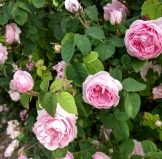
Banshee Rose
“Banshee” (found) Z 4, dbl pink 2″ early & long-blooming May-June, rich sweet damask fragrance; large shrub or climber, no die-back, very disease resistant, very tough & tolerant of low water, poor soil, shade, once established. Distinctive matte foliage, fall color- purple, orange. Common in old neighborhoods all along the Front Range.Not terribly prickly. Cut armloads for big fragrant spring bouquets!
- “Broadway Perpetual” (found, Boulder) Z 5 (4?) Large dbl strong pink quartered, deep old-rose perfume, spring & fall, sporadic in between. Good cut-flower. Seems somewhat shade-tolerant. Strong arching growth to 7’. Potential climber? Healthy foliage, moderately prickly.
-

Fairmont Proserpine, courtesy High Country Roses
“Fairmount Proserpine” (found, Denver)
- Abraham Darby (English) Z 4-5. Large, dbl, cupped, pink shading to apricot, repeats very well, strong scent, old-rose/fruity, good cut-flower. Heavy blooms are sometimes pendulous. Large, bushy shrub 5-6’ x 5-6’. Glossy disease-resistant foliage, stout canes are moderately prickly.
- Alchymist (Lg. Flowered Climber, lg.shrub) Blooms very large, warm apricot shades, very double, looks English, very fragrant, haven’t grown.
- Apothecary’s Rose (Gallica) Z 3. Very old; semidouble deep pink blooms in late spring on thin, erect prickly canes to 4’. Delicious sweet old-rose perfume. Tolerates some shade but may mildew. Perfect for herb garden.
- Baronne Prevost (Hyb. Perpetual) France, 1842. Z 5 (4?) Fat globular buds open to large 4″, flat, very double, loosely quartered deep “rose-pink” blooms with rich damask perfume, repeats well through season. Rather thorny, large arching shrub to 6’x6’ or more. Good for wrapping on pillar, pegging, self-pegging, or climbing.
- Cl. American Beauty (Lg. Fl. Climber) 1909 USA, Wichurana hyb. Z4 Large blooms are double, deep pink, paler on undersides, borne in small clusters on longish stems, strong Damask scent. In 1940’s considered the most fragrant climbing rose. Leaves dense & glossy, healthy. Vigorous growth to ~10’, tolerates some shade, neglect; profuse in June, sporadic repeat (esp. in cool summers).
- Constance Spry (English) Bounteous, very large double pink flowers in late spring on a large arching shrub easily used for draping or climbing. Bred from the Gallica ‘Belle Isis’. Fragrance includes a hit of ‘myrrh’, present in a number of David Austin’s English roses.
-
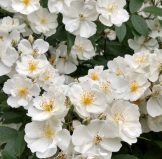
Darlow’s Enigma
Darlow’s Enigma (Cl. Hyb. Musk ?) Vigorous large shrub or climber of unknown origin with very disease-resistant, handsome glossy foliage. Small white semidouble flowers in clusters, borne throughout the season , are very sweetly scented. Very shade-tolerant. Zone 4.
- Desiree Parmentier (found Gallica) Probably incorrectly identified as Desiree, this rose is found in old neighborhoods throughout the Denver metro area. Healthy, soft apple-green foliage on a shade-tolerant, suckering shrub to 3’ in sun and taller in shade. Flowers are unique – many deep pink petals tightly packed, radiating out from conspicuous green ‘eye’, forming a dome–shaped blossom. Blooms in June. Rich Old-Rose perfume. Buds also unique, appearing to have had their tops cut off. Blooms are produced singly, not in clusters, making it ideal for cutting. Thrives on neglect once established. No die-back in the Denver-Boulder area. Prickles are numerous but very short and non-threatening.
- Fair Bianca (English) Lovely very double white blooms of old-rose style open flat and are produced in several flushes through the season on a shrub to 3’. Not very vigorous, but the fragrance is unique, including elements of licorice, lemon and myrrh.
- Felicite Parmentier (Alba Hyb.) An outstanding, classic old rose, with compact, bushy growth to 4-5’ tall. Foliage is matte, slightly greyish green, and completely healthy, even in considerable shade. Blooms are small (1 1/2″), blush pink, double and densely double, borne in small clusters, with exquisite fragrance that seems to match its appearance perfectly. No winter die-back in our area, hardy to at least Zone 4.
- Gertrude Jekyll (English) Bred from the Portland rose ‘Compte de Chambord’, which may be a better rose. Gertrude got HUGE in my garden, to 9’ tall, likes to bloom mostly at the top of the canes, hasn’t repeated very well, and is incredibly well-armed. Nevertheless, she’s worth growing for her fabulously fragrant, large, oldfashioned, double,flat pink blooms. Best grown with strict discipline (hard pruning) and protective armor.
- Golden Celebration (English)
-
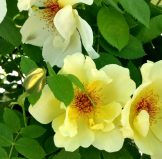
Golden Wings
Golden Wings (Shrub) A healthy, vigorous, open shrub to 5-6’ tall and wide, with large, almost single lemon yellow blossoms accented by showy dark red stamens. The petals fade quickly to white in our strong sun. Blooms all season. Keep dead-headed ‘til August , then allow it to form attractive red hips. Hardy to Zone 5, maybe 4.
- Heritage (English)
- Jude the Obscure (English) Weird name for a gorgeous flower, double, globular, shading from cream to yellow to apricot, sometimes pinkish. Flowers ball in wet or very hot weather. Blooms occur in clusters of 3 to 8. Strong fruity fragrance with elements of peach, mango, etc. With disciplinary pruning, the shrub will be 5’x5’. Bright green foliage is moderately disease-resistant; Keep dead-headed to ensure good repeat.
- Konigen von Danemark (Alba) The deepest colored of the Albas, Konigen bears medium pink, very double, 2″ flowers in June, blessed with delicious Old Rose fragrance. Totally healthy, matte grey-green foliage on arching canes to about 5’. Tolerates some shade. Hardy to Zone 4.
- Louise Odier (Bourbon) Fully double, 2″ camellia-like pink blossoms are borne in great profusion in late spring, and again in pretty good numbers through the season. The fragrance is rich Old Rose. The shrub is very vigorous, theoretically to 5’x5′, but mine is 9’x9′, suggesting the need for a pillar, trellis or wall, or strong pruning. Mine never suffers any die-back, and is pretty healthy. Repeat bloom is best if you deadhead until some time in August. Pretty thorny, but not as bad as Gertrude.
- Madame Hardy (Damask) One of the most choice Old roses. Beautiful, medium-sized pure white blooms with a green button eye on a robust, upright shrub to 5’-6’ tall. Very fragrant. June blooming, Zone 4.
- Madame Isaac Pereire (Bourbon) France, 1881. Large, purplish, deep pink, cupped blooms are sumptuous in their appearance and perfume. Blooms are carried on short laterals from strong, large canes, and can be used as a climber to about 7’. Blooms are best if protected from very hot sun, but the plant is not really shade-tolerant. Hardy to Zone 5.
- Mister Lincoln (Hyb. Tea) Black-red buds open to cherry red, richly fragrant at all stages. Blooms are large (4-4.5″), double, scrolled, high-centered, good cut. “Bush is upright and almost naturally urn-shaped, to 3’ or taller. Susceptible to mildew. Robust grower, reliable bloomer.” I haven’t grown this one yet.
-
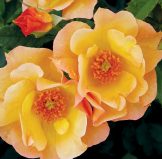
Morden Sunrise
Morden Sunrise (Canadian Shrub) A compact shrub, to about 3’x3’. Seems pretty tough in our test/display garden. Semi-double flowers open from orange buds, are 2 1/2 to 3″wide and shade from soft, tawny yellow to apricot pink, to orange. Moderately strong Tea rose fragrance is unusual for a Canadian rose, which are generally scentless. Hardy to Zone 3, almost continuous blooming.
- Nuits de Young (Moss)Laffay, France 1845. A must for its fabulously purple flowers, this rose has also been called “Old Black”. Flowers are almost double, very fragrant, with velvety maroon-purple petals emphasized by golden stamens. Mossing on buds and flower stems has a pleasant lemony pine scent when rubbed. The shrub is compact and erect, to 3 or 4’ tall, and suckers. Foliage is small and dark green. We found this rose growing in Boulder’s Columbia Cemetery, where it has survived mowing, drought, and complete neglect for at least 65 years.
- Pink Peace (Hyb. Tea) France, 1959. Enormous, intensely fragrant, very bright pink, double, with somewhat old-fashioned form, sumptuous flowers throughout the season on an upright bush. A slow starter, not exactly vigorous, but worthwhile for the blooms, which are long-lasting when cut. We know one bush in Paonia that’s about 40 years old, 4.5’.
- Reine des Violettes (Hyb. Perpetual)
-

Rosa spinosissima
Rosa spinosissima (Scotsbrier) (Species) My favorite species rose, as it perfumes my gardening hours with its strong, very sweet scent – one of the few fragrances that really carry in our dry air. The 4’ tall shrub is shade tolerant, and has very small leaves on gracefully arching canes that are covered with the lovely pure white single blooms for about 2 1/2 weeks in May. Hardy to Zone 3.
- Rosa Mundi (Gallica) Ancient, sport of Apothecary’s Rose. Named for Rosamond Clifford, mistress to Henry II. Identical in all respects to Apothecary’s, except: Dramatic semi-dbl blossoms blush-white randomly striped & splashed with crimson & pink. Petals dry beautifully for potpouri.
-
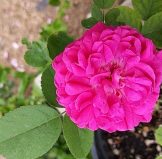
Rose de Rescht
Rose de Rescht (Portland or Damask Perpetual) A very distictive Old Rose, supposedly discovered in Iran. The flowers are small, 1 1/2″ or slightly larger, rich fuschia-red with strong purple tints, aging to magenta, very double, tightly formed rosettes, almost pom-poms, produced in small clusters amid lots of foliage. Exceptional strong Damask fragrance. Excellent repeat. The shrub is healthy, compact and bushy, to 4-5’ tall and wide. Canes are quite prickly. Hardy to Zone 4.
- Rose du Roi (Portland or Hyb.Perpetual) Lelieur, France 1815. This is a rose with a story. Bred by a French nobleman loyal to Napoleon (the second one), it was appropriated and re-named by the King, Henri XV, when he regained power. It’s also an important rose for having introduced “red” color to rose breeding in 19th century Europe. The plant is compact and bushy, growing 3-4’ tall and wide, with large leaves (I’ve noticed they’re light green in spring, with later growth being dark green with grey undersides), and prickly canes. The flowers are fabulous, fairly large, double, red mottled purple with pink reverse, loosely formed when open, and very richly scented. Repeats, with especially good display in early fall. Hardy to Zone 4-5.
-

Sharifa Asma
Sharifa Asma (English) Slow to establish, but worth the wait. Blooms are large, double, delicate shell pink, cupped, and blessed with a strong Old-rose and fruity (litchi) fragrance. Leaves are dark green, slightly leathery, and healthy as long as the shrub is not in too much shade. Growth is upright to 4’.
- Stanwell Perpetual (Hyb. Spinosissima) The earliest repeat-blooming rose to begin flowering in my garden, vying for 1st with Reine des Violettes. Bred from R. spinosissima and Autumn Damask. Canes are very prickly, arching, dark red, clothed in very fine-textured foliage, and loaded with blooms in several flushes through the season. Flowers are double, small to medium-sized, blush pink opening flat and fading to white. Very sweetly scented, with characteristics of both parents. Growth is awkward the first few years, but then fills out nicely. Hardy to Zone 4.
- Sweet Chariot (Mini) Tall for a miniature, to 2’. Small foliage and small pom-pom flowers in large clusters, unusual purple-pink color and lovely fragrance. Blooms repeatedly through season. Hardy to Zone 5.
- Sydonie (Hyb. Perpetual) Extremely reliable repeat bloom, exquisite Damask fragrance, unique flower form. Flowers are “rose-pink”, 2-2 1/2″ very double, very quartered, with strongly in-curved center petals. They are borne on very prickly arching canes on a bush that’s supposed to be 3 1/2’ tall and wide. NOT. Mine is 8’x8’ and I’m planning to do some hard pruning. Hardy to Zone 4-5, I’ve never had any winter die-back.
- Tradescant (English) I haven’t grown this one yet, but I’ve seen it elsewhere and loved the blooms. They are velvety black-red, very double, opening flat and quartered, 2-2 1/2″ wide, with a powerful Old Rose fragrance. Good cut-flower, holding its shape and color several days. Hardy to Zone 5. Reportedly grows best with hot summer weather.
- Wise Portia (English) Compact, to 2 1/2’, I grow 2 of these planted very close together to form one shrub. Very large double flowers are a unique raspberry red, rosette shaped, with uniquely pointed, lotus-like petals. Heavy-blooming, richly scented, borne singly or in sprays. Excellent repeat if kept dead-headed ‘til late summer. Then it will form large, red hips. Modern-looking medium green foliage. Provide good light and good air circulation.
- Zephirine Drouhin (Climbing Bourbon) Bizot, France 1868. Hardy to Zone 5-6. Our strain is definitely hardy in Boulder/Denver. Completely thornless, somewhat shade-tolerant, vigorous tall shrub or climber to 12’ on wall or arbor. New foliage and canes are burgundy colored. Flowers are loosely double, warm deep pink, medium-sized, profuse in spring and repeats regularly into autumn. Strongly scented- fruity Old-Rose.
Some fragrant roses to try at higher elevations:
Alba Semi-plena
Alba Suaveolens
Maiden’s Blush
Chloris
Konigen von Danemark
Rosa spinosissima
Rosa rugosa alba
Rosa rugosa ‘Magnifica’
Metis
Banshee
Gallica roses
Centifolia roses
Therese Bugnet
Morden Sunrise
Rugosa roses
